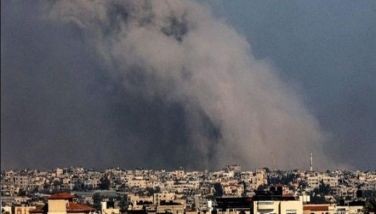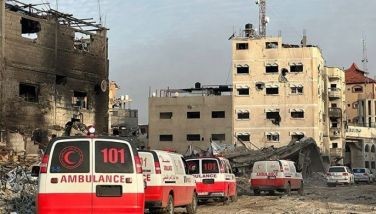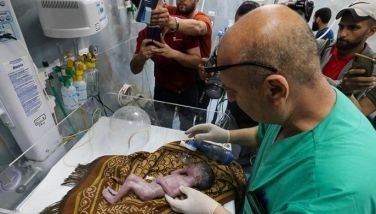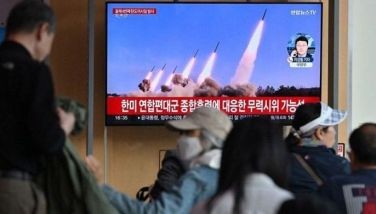Migrants flood into Germany, enjoy positive welcome
BERLIN — Climbing aboard fast, efficient trains and heading toward clean, safe beds, migrants by the thousands headed into Germany on yesterday, with the southern city of Munich expected to see 10,000 in one day alone.
Chancellor Angela Merkel, fending off criticism from conservative critics, insisted that agreeing to take in those seeking asylum was "the right thing to do."
While Merkel's deputy warned that the country is "reaching limits," European nations traded jibes over how to deal with the influx. Hungary's hard-line prime minister proposed that the European Union step up aid to Syria's neighbors to stem the flow of refugees from camps there, and declared there is no "right to a better life."
Aydan Ozoguz, a senior German government official responsible for immigrant issues, said "the pace at which people are fleeing from the region is breathtaking."
Still, she was cautious about a statement Friday by her country's foreign minister that 40,000 migrants were expected in Germany over the weekend. "We'll have to see whether this figure really comes true," she said.
Some 450,000 migrants have arrived in Germany this year. The country is expecting at least 800,000 in 2015 — by far the most in the 28-nation EU.
The welcome mat for migrants in Germany contrasts sharply with the dangerous seas they faced to get to Greece, the tear gas from Macedonian police, the razor-wire fences, crude migrant camps and burly police in Hungary and, at times, train service shutdowns along the route.
Munich has been the main point of entry for migrants reaching Germany from Hungary and Austria. Mayor Dieter Reiter said the city was reaching the limits of its capacity and officials said it was considering putting up big tents to house some of the new arrivals.
Some 3,600 migrants had arrived in Munich by late morning yesterday and a total of 10,000 or more were expected in the course of the day, said Simone Hilgers, a spokeswoman for the Upper Bavaria region's government. That would compare with the 5,800 counted on Friday.
At least two special trains were expected to take some of the migrants on to other parts of Germany. Hilgers said Bavarian officials were in constant contact with other states to find places for the newcomers and more buses to transport migrants.
The northern state of Lower Saxony said it plans in the future to have trains from Austria run to the town of Bad Fallingbostel, from where migrants could be distributed across northern Germany.
While Germany has largely welcomed the migrants and a poll this week showed broad support for the government's course, Merkel has faced some criticism from Bavaria's governing party — the Christian Social Union, which is the local sister to her own conservative Christian Democrats.
Horst Seehofer, the party's leader and Bavaria's governor, was quoted as telling the weekly Der Spiegel that the decision was "a mistake which will occupy us for a long time." Seehofer said he sees "no possibility of getting the cap back on the bottle."
"We made a decision last week in an emergency situation ... and I am convinced that it was right," Merkel said yesterday, according to the dpa news agency.
Merkel didn't mention Seehofer directly. She said Germany would do justice to its responsibility to help those who need protection.
German officials have been calling — so far to little avail — for help from other EU countries in sharing the migrant influx. Vice Chancellor Sigmar Gabriel said yesterday that "Germany sees itself in a situation where we are reaching limits." He added that "the speed (of the arrivals) is almost more problematic than the number."
Germany and Austria have stressed the right to asylum for war refugees. Hungary has argued that most are economic migrants, not entitled to enter the EU. Hungary and other eastern nations such as the Czech Republic and Poland have rejected proposed quotas to spread the human tide around the EU.
Hungary plans to start enforcing tougher frontier security on its border with Serbia starting Tuesday. Asked in an interview with German daily Bild where future arrivals should go, Hungarian Prime Minister Viktor Orban replied, "to where they came from."
He argued that people coming to Europe from camps in Lebanon, Jordan and Turkey "were safe there."
"There is no fundamental right to a better life, only a right to safety and human dignity," he declared.
Orban suggested that every EU country pay 1 percent extra into the EU budget while reducing other spending by the same amount. He was quoted as saying that would generate 3 billion euros ($3.4 billion) for aid, which could be increased "until the stream of refugees dries up."
Other European officials disagreed with his assessment.
"I must say that I find what Mr. Orban is saying extremely cynical, that they're safe there," Ozoguz said on Germany's rbb-Inforadio. "Everyone who has been following this knows that the food rations there have been halved — one really can't speak of safety."
Saudi Arabia, which along with other oil-rich Gulf states has faced suggestions that it should to more to address Syrian refugees' plight, responded by saying it has taken in about 2.5 million Syrians since fighting began.
The official Saudi Press Agency quoted an unidentified official source at the Foreign Ministry saying the kingdom does not consider those taken in as refugees and does not house them in camps "order to ensure their dignity and safety."
- Latest
- Trending






























